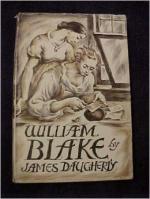|
This section contains 2,560 words (approx. 9 pages at 300 words per page) |

|
The Blakean Revolution
Summary: William Blake's poetry contains far-reaching critiques and commentaries of a variety of social issues of his time, particularly regarding human nature, public education, the British monarchy, and the Church of England. These critiques and commentaries were safe from prosecution, as Blake expertly disguised them in symbolism untranslatable by most of his contemporaries.
All artists throughout history have been influenced and inspired by the world that surrounds them; their political, social, historical and ideological context inspires their work in some profound way. British poet William Blake was no exception. The vivid romanticism of his poetry is laced with threads of social commentary disguised in thoughtful symbols, metaphors, and allegories. This was the only way in which Blake could have been the social commentator he is recognized as today. In the Romantic Era of the late 18th and early 19th century, England was administrated jointly by the overbearing British Monarchy, and the corrupt Church of England. This atmosphere of oppression was suffocating to Blake, a talented, intelligent prodigy with a certain sentimentality rare to the times. He grew up surrounded by rebellion, witnessing such events as the American Revolution, followed quickly by the French Revolution. This atmosphere kindled Blake's rebellious spirit. He...
|
This section contains 2,560 words (approx. 9 pages at 300 words per page) |

|


